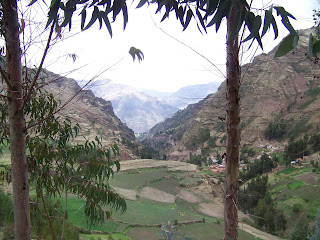One day we drove out of Cusco along the road to Pisac. We were on our way to Amaru Village, where the residents had agreed to show us how they process, spin, and weave alpaca, llama and sheep's wool. We stopped to look out over the Sacred Valley. The Urubamba River flows at the bottom of this valley from south to northeast. It is one of the headwaters of the Amazon, and eventually empties to the Atlantic Ocean. Over many, I suspect hundreds of, years, many of the slopes of the Andes have been terraced. Some terraces are built for agriculture, and some for errosion control. I'd say that's a pretty ambitious land use plan, terracing the Andes.
On our first of wrong turns, we encountered an obstruction in the road. Someone had driven into the ditch. Some of the guys on our bus jumped out the help the car on its way, while these women watched. Much of the farming is still done by hand. Many of the land plots are small, so many of the farmers can't afford machinery or even oxen.
While the guys were helping with the car, this shepard came along the road.
After turning the bus around and trying another road, the bus driver refused to go further when we encountered this stream crossing the road.
So, he turned the bus around in rather tight conditions. I opted to stay off the bus during this maneuver.
After taking a local farmer onto the bus to show us the way, we made it to Amaru Village, only an hour late. The whole village was assembled to greet us. Musicians played while the women pelted us with rose petals.
All the villagers were dressed in their traditional clothing, which they told us they always wear. It wasn't just a show for us.
The village leader welcomed us.
The women demonstrated cleaning and spinning the fibers.
We saw them prepare natural dyes and boil the spun fibers.
Some looms were being warped.
And some of the women were weaving.
Men also weave in this village.
We had more music and dancing, and the villagers prepared a snack of corn and beans for us.
Notice that they serve the food on the ground and right on top of one of those beautiful handwoven fabrics. They also spread the handwoven pieces on benches and on the ground for us to sit on.
We left the village hospitality to begin our (shorter) journey back to Cusco. We stopped at Dona Clorinda's for lunch, where there was live music on the Andean harp.
One more stop on the way back to Cusco - Awana Kancha, where the Amaru villagers sell their weavings. Stay tuned for the next post.








































Yikes! That was some adventure!!
ReplyDelete